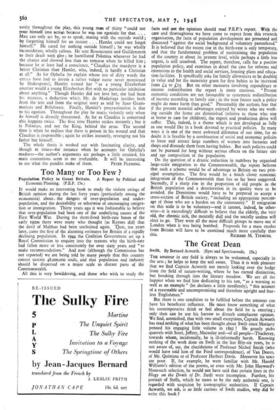Too Many or Too Few ?
IT would make an interesting book to study the violent swings of British opinion during the last forty years (particularly among the economists) about. the dangers of over-population and under- population, and the desirability or otherwise of encouraging emigra- tion or immigration. Thirty years ago it was fashionable to believe that over-population had been one of the underlying causes of the First World War. During the short-lived birth-rate boom of the early 192os there were many who thought (as Keynes did) that the devil of Malthus had been unchained again. Then, ten years later, came the first of the alarming estimates for Britain of a rapidly declining population. In 1944 the Coalition Government set up a Royal Commission to enquire into the reasons why the birth-rate had fallen more or less consistently for over sixty years and " to make recommendations." And now (although the Commission has not reported) we are being told by many people that this country cannot sustain 48,000,000 souls, and that population and industry should be dispersed on a major scale to distant parts of the Commonwealth.
All this is very bewildering, and those who wish to study the
facts and not the opinions should read P.E.P.'s report. With the care and thoroughness we have come to expect from this research organisation, the facts of population development are presented and discussed " against the social background of voluntary parenthood." It is believed that the recent rise in the birth-rate is only temporary, and that the fundamental problem of maintaining the population of the country at about its present level, while perhaps a little less urgent, is still unsolved. The report, therefore, calls for a positive population policy, and examines in detail the case for reforms and extensions to the health and social services, housing plans and educa- tion facilities. It specifically asks for family allowances to be doubled in value and for the maternity grant for first babies to be increased from £4 to £15. But on other measures involving expenditure or income redistribution the report is more cautious. " Present economic conditions are not favourable to systematic redistribution of income according to family size ; in the near future such a policy might do more harm than good." Presumably the authors fear that if the present material advantages enjoyed by wives who are work- ing outside the home are diminished (relative to those who stay at home to care for children), the export and production drive will suffer. This, indeed, is a theme which is not developed as fully as one would like in a book devoted to practical policies. In many ways it is one of the most awkward dilemmas of our time, for no doubt it is feasible by a combination of social and economic policies to force and attract large numbers of women into factories and shops and dissuade them from having babies. But such policies could not be pursued for long without serious effects on the future size and age composition of the population.
On the question of a drastic reduction in nuMbers by organised large-scale emigration to the Commonwealth, the report believes that such a scheme would be of advantage to Britain on two prin- cipal assumptions. The first would be a much closer economic integration of the. Commonwealth than has so far been suggested. Secondly, if a sharp rise in the proportion of old people in the British population and a deterioration in its quality were to be avoided, the Dominions would have to be prepared to accept a cross-section of British society, " including an appropriate percent- age of those who are a burden on the community." If emigration on this scale is to be voluntary—and it cannot, indeed, be other- wise—it is exceedingly difficult to believe that the elderly, the very old, the chronic sick, the mentally dull and the socially useless will elect to go. They were all the most difficult groups to move out of London when it was being bombed. Proposals for A mass exodus from Britain will have to be examined much more carefully than


































 Previous page
Previous page